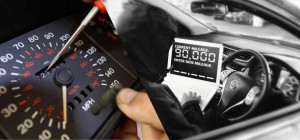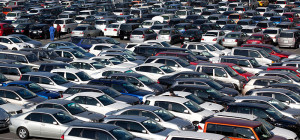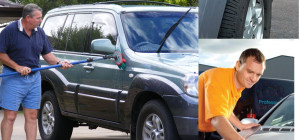 You're driving down the road on your way to work. You were in a real rush this morning to get out the door, but every force in the universe seemed to unite to prevent you from getting to work on time. Everyone seemed to have the goal of adding precious minutes to your commute - your kids, your spouse, your neighbor, even your neighbor's yapping toy poodle. So now you're barreling down the road and digging in your bag for the folder you fear you left at home. You glance down at the bag for only a second, but a second is all it takes. You crash into the other car with a deafening thud. You've just gotten into a car accident.
You're driving down the road on your way to work. You were in a real rush this morning to get out the door, but every force in the universe seemed to unite to prevent you from getting to work on time. Everyone seemed to have the goal of adding precious minutes to your commute - your kids, your spouse, your neighbor, even your neighbor's yapping toy poodle. So now you're barreling down the road and digging in your bag for the folder you fear you left at home. You glance down at the bag for only a second, but a second is all it takes. You crash into the other car with a deafening thud. You've just gotten into a car accident.
Even after a relatively minor accident, your brain will be rattled, making it hard to function rationally. So it's very important to know ahead of time precisely what you need to do after getting into a car accident.
1. Assess Injuries and Damages
The number one priority after any automotive accident is to determine whether anyone is hurt and requires immediate medical attention. It is crucial to remain calm after an accident; panicking will only make the situation worse. Obviously, if anyone has been significantly injured in the crash, you need to contact emergency services right away. Your health and the health of other drivers or passengers take precedent over everything else.
2. Involve the Police
Even if the accident was relatively minor, you should still file a report with the police. This serves the purpose of ensuring there will be a legal accident report should any issues arise later on. DO NOT leave the scene until an accident report has been completed.
3. Keep a Tight Lip
After an accident, adrenaline will be pumping through your system and you may be tempted to call up everyone in your address book to tell them what just happened. However, you need to resist that urge until you've had a chance to calm down and really assess the situation. With your heart pumping and mind racing, you may admit liability or fault which you will regret later on once you've had a chance to calm down. According to Ones Insurance never admit that the accident was your fault.
4. Gather the Facts
Most people intuitively know that after an accident they are supposed to exchange insurance and vehicle information with everyone involved. But in the heat of the moment, this step often ends up being neglected which can throw a wrench in any insurance claims you attempt to file. According to Consumer Reports, make sure you get the following information from all parties involved in the accident:
- Names
- Home addresses
- Phone numbers
- Insurance companies
- Vehicle descriptions
- Vehicle identification numbers
- License plate numbers
Also, simply jotting down the license plate numbers of the cars isn't enough. Most major insurance providers keep records of the make/model and vehicle identification numbers only, so a license plate number won't be very helpful.
5. Make the Call
It's finally time to have a discussion with your insurance agent about the accident you were involved in. Don't wait until days after the incident to contact them. It's best to call while you are still at the scene and details are fresh in your mind. Sometimes the police officer you are filing the accident report with can help you provide the most accurate and detailed information to your insurance agent.
And of course, the very last step is to go home, hug your loved ones, and thank your lucky stars that things didn't turn out worse. A final word of advice: it would be a good idea to print out a copy of these steps on what to do when involved in an accident and place it in a convenient location in your car. It's never a bad idea to be prepared.
Written by Oscar Perez. Oscar has been a provider of defensive driving classes since 1989 and writes for LeraBlog and comedydefensivedriving.com







